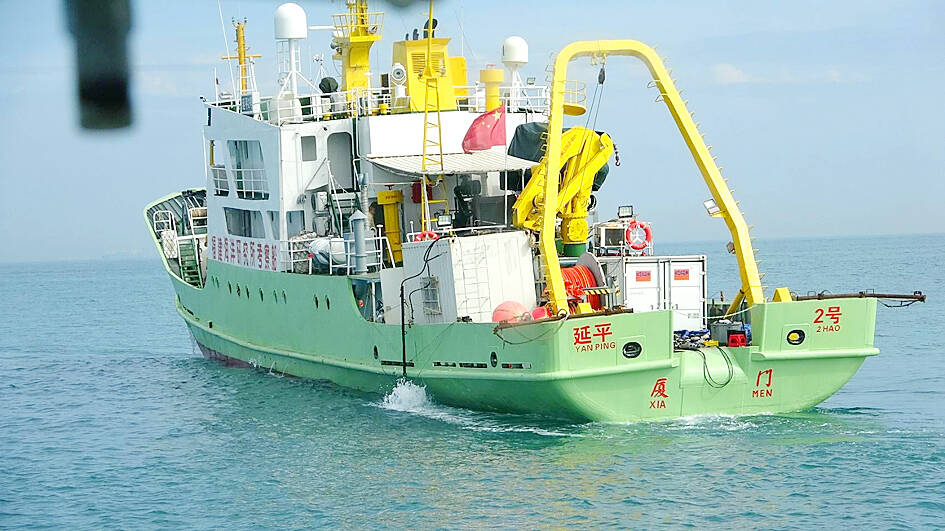The National Security Bureau (NSB) yesterday said that it has identified at least eight methods by which Chinese vessels intrude into restricted waters near Kinmen County, adding that such activities have made monitoring the area more difficult.
Bureau Director-General Tsai Ming-yen (蔡明彥) made the remarks in response to a question by Chinese Nationalist Party (KMT) Legislator Chen Yeong-kang (陳永康) at a meeting of the legislature’s Foreign Affairs and National Defense Committee about an image showing Chinese vessels intruding into Taiwan’s territorial waters.
Tsai confirmed that the image captured at 8:40am yesterday showed that seven to eight commercial vessels passed through restricted waters near Kinmen, adding that there were also a few vessels that could not be identified because their automatic identification system was switched off.

Photo courtesy of the Coast Guard Administration’s Kinmen-Matsu-Penghu Branch
Chen said that he suspected that they were Chinese fishing boats commissioned by the Beijing government to carry out special missions, or vessels operated by the China Coast Guard.
Such activities in restricted waters near Kinmen should not be called “gray zone harassment” and should be regulated by Taiwan’s Coast Guard Administration (CGA), but the agency has a limited number of ships to patrol the area, Chen said.
He warned that Chinese vessels might intrude more frequently into Taiwanese waters and drop anchor there under the pretext of being commercial ships, which could affect safety and law enforcement in waters near Kinmen.
Tsai said that the coast guard has dispatched vessels to the outlying islands to address the abnormal activities at the front line, including identifying the locations and types of vessels.
Meanwhile, a bureau analysis has identified eight to nine methods by which Chinese vessels intruded into Taiwan’s territorial waters, such as turning off their automatic identification systems and using maritime mobile service identity numbers from other ships, Tsai said.
“This has indeed raised the level of difficulty of monitoring intrusions of Chinese ships,” Tsai said.
Aside from boosting intelligence-sharing efficiency, the coast guard has allocated about NT$20 billion (US$653 million) to build more patrol ships, which should boost its capabilities in reporting, verifying and repelling intruding vessels.
Separately, Chen said that China’s Xiamen Xiangan International Airport is scheduled to be completed by the end of this year.
As a member of the International Civil Aviation Organization, China would announce the designated guidance zones for the airport’s takeoff and landing operations, which could cover half of Kinmen County, Chen said.
Beijing could use this to expand its jurisdiction over Taiwanese territories, he said.
The Ministry of National Defense, Mainland Affairs Council and CGA should closely monitor the situation and be prepared to respond promptly if needed, he said.

The manufacture of the remaining 28 M1A2T Abrams tanks Taiwan purchased from the US has recently been completed, and they are expected to be delivered within the next one to two months, a source said yesterday. The Ministry of National Defense is arranging cargo ships to transport the tanks to Taiwan as soon as possible, said the source, who is familiar with the matter. The estimated arrival time ranges from late this month to early next month, the source said. The 28 Abrams tanks make up the third and final batch of a total of 108 tanks, valued at about NT$40.5 billion

Two Taiwanese prosecutors were questioned by Chinese security personnel at their hotel during a trip to China’s Henan Province this month, the Mainland Affairs Council (MAC) said yesterday. The officers had personal information on the prosecutors, including “when they were assigned to their posts, their work locations and job titles,” MAC Deputy Minister and spokesman Liang Wen-chieh (梁文傑) said. On top of asking about their agencies and positions, the officers also questioned the prosecutors about the Cross-Strait Joint Crime-Fighting and Judicial Mutual Assistance Agreement, a pact that serves as the framework for Taiwan-China cooperation on combating crime and providing judicial assistance, Liang

A group from the Taiwanese Designers in Australia association yesterday represented Taiwan at the Midsumma Pride March in Melbourne. The march, held in the St. Kilda suburb, is the city’s largest LGBTQIA+ parade and the flagship event of the annual Midsumma Festival. It attracted more than 45,000 spectators who supported the 400 groups and 10,000 marchers that participated this year, the association said. Taiwanese Designers said they organized a team to march for Taiwan this year, joining politicians, government agencies, professionals and community organizations in showing support for LGBTQIA+ people and diverse communities. As the first country in Asia to legalize same-sex

MOTIVES QUESTIONED The PLA considers Xi’s policies toward Taiwan to be driven by personal considerations rather than military assessment, the Epoch Times reports Chinese President Xi Jinping’s (習近平) latest purge of the Chinese People’s Liberation Army (PLA) leadership might have been prompted by the military’s opposition to plans of invading Taiwan, the Epoch Times said. The Chinese military opposes waging war against Taiwan by a large consensus, putting it at odds with Xi’s vision, the Falun Gong-affiliated daily said in a report on Thursday, citing anonymous sources with insight into the PLA’s inner workings. The opposition is not the opinion of a few generals, but a widely shared view among the PLA cadre, the Epoch Times cited them as saying. “Chinese forces know full well that